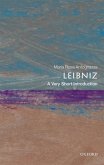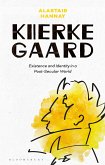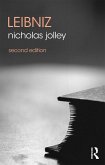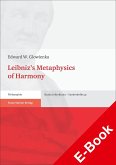Dieser Download kann aus rechtlichen Gründen nur mit Rechnungsadresse in A, B, BG, CY, CZ, D, DK, EW, E, FIN, F, GR, HR, H, IRL, I, LT, L, LR, M, NL, PL, P, R, S, SLO, SK ausgeliefert werden.

Zum runden Todestag von Gottfried Wilhelm Leibniz am kommenden Montag sind abseits strikt akademischen Terrains nicht viele neue Titel anzuzeigen. In einer überarbeiteten Neuauflage ist die Biographie von Eike Christian Hirsch erschienen ("Der berühmte Herr Leibniz". C.H. Beck Verlag, 659 S., geb., 29,95 [Euro]). Dieses Lebensbild zeigt eindrucksvoll, dass sich Leibniz' Ideen selbst dort, wo es schnell etwas anstrengend werden könnte, in ihren Grundzügen auf ganz untechnische Art erläutern lassen. Wer genauer wissen will, was es mit ihnen auf sich hat, kann den Band von Hans Poser zur Hand nehmen, der Aufsätze des renommierten Leibniz-Forschers versammelt ("Leibniz' Philosophie". Über die Einheit von Metaphysik und Wissenschaft. Meiner Verlag, 528 S. br., 36,- [Euro]). Für Poser ist die Auseinandersetzung mit Leibniz nicht bloß eine reizvolle historische Angelegenheit, die den obsolet gewordenen Rahmen einiger erstaunlich moderner Ideen rekonstruiert. Er sieht in Leibniz' Metaphysik Fragen konstruktiv behandelt, die auch heute nicht einfach vom Tisch sind. Wer die Gelehrtenwelt näher kennenlernen möchte, deren korrespondierendes, manchmal auch reisendes Mitglied Leibniz war, kann einen neuen Sammelband zur Hand nehmen. Er konzentriert sich auf die Strategien der Selbstdarstellung in den Netzwerken der Gelehrsamkeit, samt Maskenspielen und raffinierten Techniken zur Sicherung von Prioritätsansprüchen ("G.W. Leibniz und der Gelehrtenhabitus". Böhlau Verlag, 292 S., br., 40,- [Euro]). Ganz kurz macht es Manfred Geier, der einen Essay zu Leibniz' "Theodizee" als E-Book vorlegt ("Leibniz oder Die beste aller möglichen Welten". Rowohlt Rotation, 52 S., 1,99 [Euro]), mit dem man sich gegen deren flotte Ironisierung in Voltaires "Candide" rüsten kann. Was sich auf knappem Raum unterbringen lässt, zeigt eindrucksvoll die neue Einführung der Londoner Leibniz-Spezialistin Maria Rosa Antognazza ("Leibniz". A Very Short Introduction. Oxford University Press, 134 S., br., 7,99 [Euro].) Sie wird am Montag den Festvortrag im Alten Rathaus zu Leipzig halten. (hmay)
Alle Rechte vorbehalten. © F.A.Z. GmbH, Frankfurt am Main









